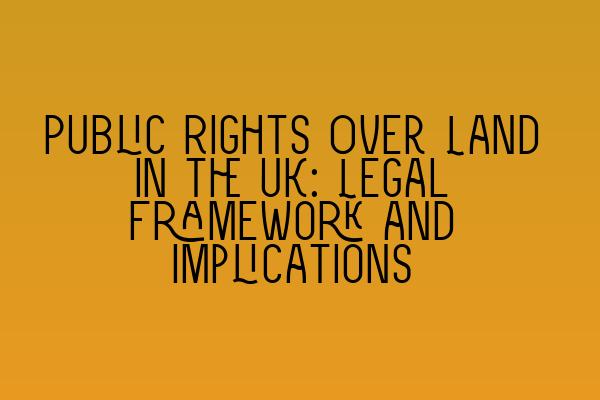Public Rights Over Land in the UK: Legal Framework and Implications
As a solicitor specializing in property law and land law, it is essential to have a thorough understanding of the legal framework surrounding public rights over land in the UK. These rights play a crucial role in determining the scope of a person’s access and use of public spaces. In this blog post, we will explore the legal principles, implications, and key considerations related to public rights over land.
Understanding Public Rights Over Land
Public rights over land encompass various legal entitlements granted to individuals or groups to use and access land that is privately owned. These rights are separate from the general public’s right to access public highways, parks, or other designated public spaces. Instead, they specifically refer to rights granted over privately owned land, allowing certain activities or access to specific areas.
Legal Framework and Common Law Principles
Public rights over land are primarily governed by common law principles and can also be subject to statutory regulations and acts. The most common types of public rights are rights of way, rights of access, and rights to use specific areas or facilities, such as beaches, riversides, or footpaths.
Rights of Way: A right of way is a legal right allowing individuals to pass through or use a particular route or pathway on private land. There are two main types of rights of way: public rights of way and private rights of way. Public rights of way grant the general public the right to use specified routes, such as footpaths or bridleways, which are legally recognized. Private rights of way, on the other hand, are more specific and grant particular individuals or groups the right to access their land via a specified route.
Rights of Access: Rights of access refer to the entitlement to access and use specific areas of privately owned land for recreational purposes or leisure activities. These rights are often associated with public spaces, nature reserves, or areas of natural beauty where the public is allowed to enjoy the surroundings.
Rights to Use Specific Areas or Facilities: Some public rights over land relate to the use of particular areas or facilities on privately owned land. For example, a right to use a beach or riverside for fishing or boating may be granted to the public, provided it is done in accordance with any applicable regulations or restrictions.
Implications and Considerations
Public rights over land can have significant implications for landowners, as well as the general public. For landowners, it is crucial to understand their legal obligations and the impact these rights may have on their property. Landowners should be aware that they cannot obstruct or interfere with public rights over their land, as this may result in legal action or claims for damages.
From a public perspective, it is essential to understand the limitations and responsibilities that come with exercising public rights over land. For instance, individuals must ensure they use the land in accordance with any applicable restrictions or regulations set out by the landowner or relevant authorities.
It is also worth noting that public rights over land can vary depending on the nature of the land, its location, and any specific legal provisions applicable to the area. Therefore, it is highly recommended to seek legal advice to fully understand the rights and obligations pertaining to a particular situation.
Conclusion
Public rights over land are a fundamental aspect of property law and land law in the UK. It is essential for solicitors specializing in this field to have a comprehensive understanding of the legal framework and implications surrounding public rights. By being knowledgeable about the legal principles and considerations related to public rights over land, solicitors can effectively advise both landowners and the general public on their rights and obligations.
If you found this article informative, you may also be interested in the following related articles:
– SQE 1 Practice Exam Questions
– SQE 1 Practice Mocks FLK1 FLK2
– SQE 2 Preparation Courses
– SQE 1 Preparation Courses
– SRA SQE Exam Dates
